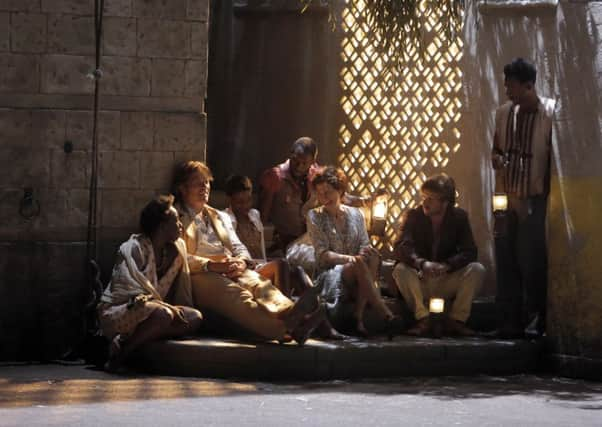Sao Paolo Orchestra revives works by exploited Shostakovich


The Sao Paolo Orchestra arrived at the Festival last Monday with their principal conductor Marin Alsop with a programme of unusual choral works and a hunk of Shostakovich – his fifth symphony, written in a climate of extreme fear after the murderous Stalin pointed the finger at the composer for “a mess instead of music”.
The Brazilians, revitalised in recent years under Alsop’s stirring baton, have a vigorous, likeable sound that sometimes descends into mild disorder, apparent in Bernstein’s Chichester Psalms. But the early evening belonged to the Festival Chorus, impassioned, subtle despite their great numbers, and sweet, clear-voiced treble Taylor Torkington from St Mary’s Music School. More choral amplitude in Villa-Lobos’ Choros No 10, 12 minutes of rhythmic intricacy, the chorus tight and incisive as the rhythms itched about the orchestra. The Shostakovich was less successful – Alsop coaxed intensity from her Brazilian band, but the lot seemed a little flat.
Advertisement
Hide AdAdvertisement
Hide AdThe following night, the Minnesota Orchestra were in the hall, back from the brink of oblivion after an extended pay dispute. This crack orchestral troupe are the quintessential big glossy American orchestra, the strings rich and sweeping, all sections fanatically ordered and cooperative. The effect can lack clarity at times, but the orchestra’s majesty is in its richness of sound.
Chief Conductor Osmo Vanska fielded Sibelius and Beethoven, including a breathtakingly conversational telling of the composer’s Violin Concerto in D minor under the vocal bow of Pekka Kuusisto that trimmed flamboyant dramatic excesses with a dissembling lightness, as if playing a simple folk tune.
Afterwards, Kuusisto spoke of people travelling “not of their own free will” before playing a very moving Swedish folk song “We have sold our homes”. Kuusisto duetting with Vanska on the clarinet, whilst the orchestra laid down their instruments and hummed. It showed the relevance of classical music – indeed music itself – to communicate human experience and feeling in a way that is more direct and immediate than any other art form. A thoroughly gripping telling of Beethoven’s Fifth Symphony ended the evening.
Steven Isserlis was no less gripping in his second Queen’s Hall recital of Beethoven sonatas with fortepianist Robert Levin. I could listen to Isserlis all day in this mode, his cello plangent in the opening Adagio sostenuto of the Cello Sonata in G Minor and leaping energetically through the Rondo against the clarity of the fortepiano. More affecting adagio in the late Cello Sonata in C Major, before the Sonata in D Major, written as the composer finally went deaf. Isserlis played the Adagio as if inhabiting a distant world before a triumphant and fiendish finale filled with emphatic playing from both cellist and pianist.
Cosi fan Tutte, in a new co-production between the Festival d’Aix-en-Provence, Opera de Lille, Korea National Opera and Edinburgh International Festival closed this year’s opera programme on Thursday night in unsettling, incisive vein.
Director Christophe Honore is, in his native France, a respected journalist, author and film director. Cosi is a difficult opera to stage. Its central misogyny is so repugnant that the humour is difficult to stomach. Honore, conversely, re-finds the humour – what there is – by making his characters so dislikeable that they seem to invite their own demise. He removes the action from 17th century Naples to 1930s Africa in a backwater Italian Fascist colony that exists on inhumanity and cruelty. Women are sex objects, usually unwilling – society is caught in a downward spiral of no moral boundaries.
Sexism is bracketed here with racism, women and Africans brutalised, used, and cast aside in equal measure. In the opening scene, set to a 1930s tune about “Mussolini’s” gold in Africa, a local woman is raped by Guglielmo, one of the four central lovers in the piece. It makes the comedy difficult, but Honore admits this and the audience is almost never allowed to relax into familiarity.
Advertisement
Hide AdAdvertisement
Hide AdWhen the women, represented by the maid Despina, played by the perky Sandrine Piau, try to play men at their own game, it never works out. Despina nearly gets raped and sings the rest of her aria, shaken, vulnerable; Dorabella and Fiordiligi (the excellent Kate Lindsey and Lenneke Ruiten) are humiliated by their lovers, themselves abhorrent in “blackface”. The only quiet moment is during the barren still of the trio “Soave sia il vento”. And the curtain goes down on Fiordiligi putting a gun in her mouth. What seems clear is that it is that petty power and the lust for it that does for humanity.
The Freiburger Barockorchester are urgent and incisive in the pit under conductor Jeremie Rhorer the cast very fine indeed, backed by the excellent Cape Town Opera Chorus. And if Don Alfonso climbs triumphally on the table in the tawdry interior as he announces “cosi fan tutte” – all women are like this – there is nothing triumphal in the depiction. There is no safe place here but, perhaps, the small love found by Despina and her African servant lover. And Alfonso’s few casual words, set to ravishing music, still repulse more than any directorial tableaux.